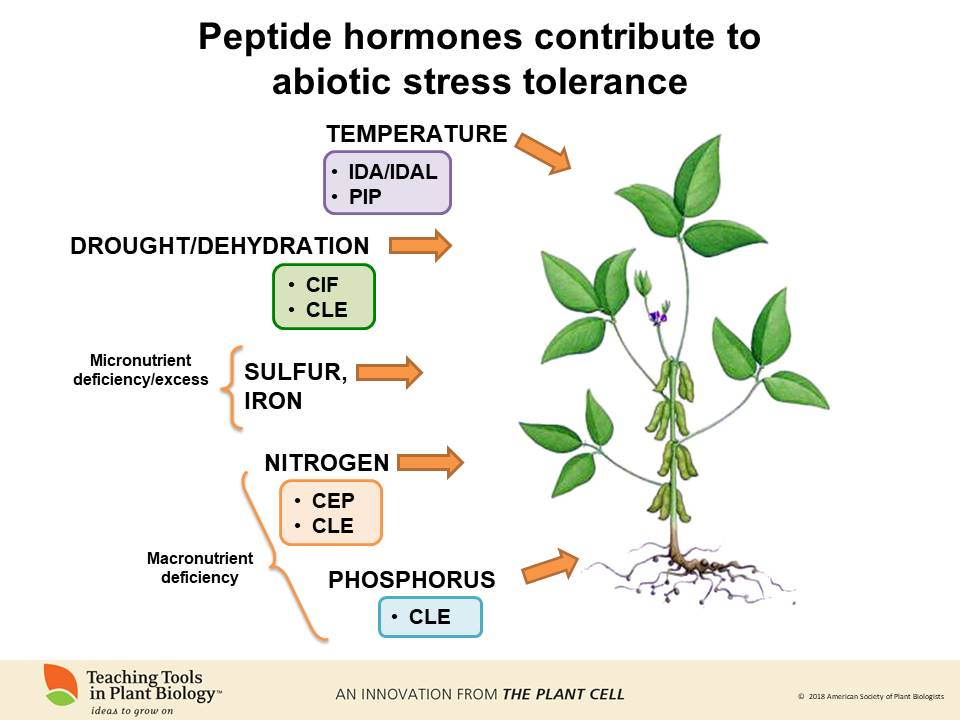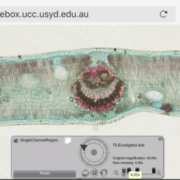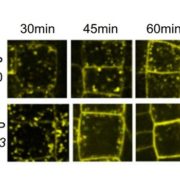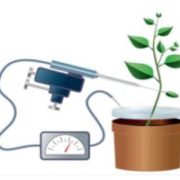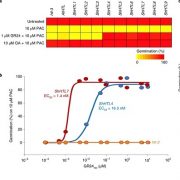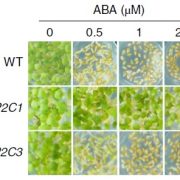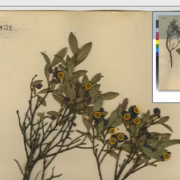New Teaching Tool, “Small and mighty, peptide hormones in plant biology”
We’re excited to annouce the publication of The Plant Cell‘s latest Teaching Tool, “Small and mighty: Peptide hormones in plant biology,” by Sonali Roy, Peter Lundquist, Michael Udvardi, and Wolf-Rüdiger Scheible, available without subscription at Plantae.org.
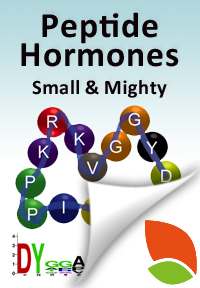 A phytohormone (plant hormone) is defined as a naturally occurring plant compound that acts as a signal molecule even at low concentrations; familar phytohormones include auxin, cytokinin etc. Interestingly, 5- to 60- amino acid long peptides also display many characteristics of hormones. In plants, peptide hormones have been found to regulate gene expression and cause changes in a variety of parameters and processes, including cell size and number, fertilization, plant responses to nutrient availability, and defense against pathogens.
A phytohormone (plant hormone) is defined as a naturally occurring plant compound that acts as a signal molecule even at low concentrations; familar phytohormones include auxin, cytokinin etc. Interestingly, 5- to 60- amino acid long peptides also display many characteristics of hormones. In plants, peptide hormones have been found to regulate gene expression and cause changes in a variety of parameters and processes, including cell size and number, fertilization, plant responses to nutrient availability, and defense against pathogens.
This Teaching Tool covers the early discoveries of peptide hormones in animals and plants, the structure and biogenesis of peptide hormones, the roles of post-translational modifications, tools used to identify peptide hormones, the mobility and perception of peptide hormones, and some of the physiological roles of peptide hormones in plants. A summary of known peptide gene families is provided as an appendix.
Like all Teaching Tools, this article has undergone rigorous peer review, and includes a set of PowerPoint slides for use in teaching, a review article suitable for undergraduates, a teaching guide with questions to prompt students to synthesize the information presented, and a short, 24-slide abridged slide set.
Four authors contributed to this Teaching Tool, providing their breadth of perspectives and expertise.
 Sonali Roy obtained her PhD. at the John Innes Centre in Norwich, UK investigating the role of the phytohormone auxin in symbiotic nitrogen fixation. She continues her research interests in signalling molecules during her post-doctoral appointment in Dr. Udvardi’s lab at the Samuel Roberts Noble Foundation where she examines the role of small signalling peptides in symbiotic interactions. In addition to investigative research, Sonali particularly enjoys mentoring and providing hands-on training to plant and molecular bioscience students. She also serves as an Assistant Features Editor for the Plant Cell.
Sonali Roy obtained her PhD. at the John Innes Centre in Norwich, UK investigating the role of the phytohormone auxin in symbiotic nitrogen fixation. She continues her research interests in signalling molecules during her post-doctoral appointment in Dr. Udvardi’s lab at the Samuel Roberts Noble Foundation where she examines the role of small signalling peptides in symbiotic interactions. In addition to investigative research, Sonali particularly enjoys mentoring and providing hands-on training to plant and molecular bioscience students. She also serves as an Assistant Features Editor for the Plant Cell.
Of this new Teaching Tool, Sonali says, “With the discovery of the first peptide hormone in plants almost 25 years ago, biologists uncovered 1000s of new putative regulatory molecules in addition to the nine ‘classical’ hormone classes. Even though a huge body of literature has accumulated over the years on these novel hormones, most of this information is still only available in the form of research manuscripts and specialized reviews. With this teaching tool we hope to provide a global overview of the present status of the field, organized into distinct sub-sections for clarity. We intend to make this topic more accessible to students of biology at any stage of their career who want to learn more about these exciting new regulatory molecules!”
 Peter Lundquist is an Assistant Professor in the Department of Biochemistry and Molecular Biology at Michigan State University and a member of the Plant Resilience Institute. His primary interests focus on chloroplast biochemistry and particularly lipid-protein particles contained within chloroplasts called plastoglobules. Peter completed his PhD at Cornell University, studying chloroplast proteomics, and was an Alexander von Humboldt post-doctoral fellow in Düsseldorf, Germany, before completing a second post-doctoral appointment at the Noble Research Institute. Here, he studied small signalling peptides in Medicago truncatula, seeking to understand their relationship to macronutrient limitation and nodulation.
Peter Lundquist is an Assistant Professor in the Department of Biochemistry and Molecular Biology at Michigan State University and a member of the Plant Resilience Institute. His primary interests focus on chloroplast biochemistry and particularly lipid-protein particles contained within chloroplasts called plastoglobules. Peter completed his PhD at Cornell University, studying chloroplast proteomics, and was an Alexander von Humboldt post-doctoral fellow in Düsseldorf, Germany, before completing a second post-doctoral appointment at the Noble Research Institute. Here, he studied small signalling peptides in Medicago truncatula, seeking to understand their relationship to macronutrient limitation and nodulation.
He remarks, “Small signaling peptides (SSPs) have been described as a genome within a genome, harboring thousands of previously unrecognized players in plant growth and development. Revealing this hidden gene space has just begun and will prove a rich source of knowledge for improving and manipulating plant traits for mankind. We are proud to offer this valuable resource for the plant community, presenting the current state of knowledge of plant SSPs in a highly accessible format.”
 Michael Udvardi is Director of the Plant Biology Division at the Samuel Roberts Noble Foundation in Ardmore, Oklahoma, USA. He is primarily interested in how plants obtain nitrogen for growth, either as mineral nitrogen from the soil or from atmospheric di-nitrogen via symbiotic nitrogen fixation in bacteria. Specifically, he has contributed to our understanding of transport and metabolism in root nodules. Recently, his group has expanded its work on plant nitrogen to include associative nitrogen fixation, as well as nitrogen recycling during shoot senescence, in perennial plants. His group also has interests in plant acclimation and adaptation to abiotic stress, including drought and salinity.
Michael Udvardi is Director of the Plant Biology Division at the Samuel Roberts Noble Foundation in Ardmore, Oklahoma, USA. He is primarily interested in how plants obtain nitrogen for growth, either as mineral nitrogen from the soil or from atmospheric di-nitrogen via symbiotic nitrogen fixation in bacteria. Specifically, he has contributed to our understanding of transport and metabolism in root nodules. Recently, his group has expanded its work on plant nitrogen to include associative nitrogen fixation, as well as nitrogen recycling during shoot senescence, in perennial plants. His group also has interests in plant acclimation and adaptation to abiotic stress, including drought and salinity.
Michael says, “I’m excited about SSPs because what we know about them is just the ‘tip-of-the-iceberg’ of SSP biology. There are hundreds, if not thousands of SSPs encoded in each plant genome and from the few that have been characterized we know they play profound and varied roles in plant growth and development. The fact that they work from outside the cell to trigger events inside plant cells opens the door to use SSPs as natural and potent plant growth regulators in agriculture. Therefore, SSPs are compelling targets for basic and applied research, a veritable ‘gold-mine’ for plant R&D! I’m also excited to share what we know about SSPs with the next generation of scientists, via this new Teaching Tool, to help build research momentum in this promising area.”
 Wolf-Rüdiger Scheible is a principal investigator in the Plant Biology Division of the Samuel Roberts Noble Foundation in Ardmore, Oklahoma, and was previously a group leader at the Max-Planck Institute for Molecular Plant Physiology in Potsdam, Germany. A focus of his research is to investigate how model plants respond to macronutrient limitation at the molecular level, and to apply the acquired knowledge to improve crop and forage plant species. Together with Michael and other colleagues he was recently awarded an NSF-PGRP grant to investigate small signalling peptides in Medicago truncatula, with an emphasis on macronutrient regulation of root and nodule development.
Wolf-Rüdiger Scheible is a principal investigator in the Plant Biology Division of the Samuel Roberts Noble Foundation in Ardmore, Oklahoma, and was previously a group leader at the Max-Planck Institute for Molecular Plant Physiology in Potsdam, Germany. A focus of his research is to investigate how model plants respond to macronutrient limitation at the molecular level, and to apply the acquired knowledge to improve crop and forage plant species. Together with Michael and other colleagues he was recently awarded an NSF-PGRP grant to investigate small signalling peptides in Medicago truncatula, with an emphasis on macronutrient regulation of root and nodule development.
Wolf comments, “Given the extraordinary importance of SSPs, their numeral abundance and potential for breakthroughs in basic and applied research, we were excited about the opportunity to share this hot topic with students and colleagues around the globe. TTPB provided us with an ideal platform to do so and to ensure lasting impact.”
